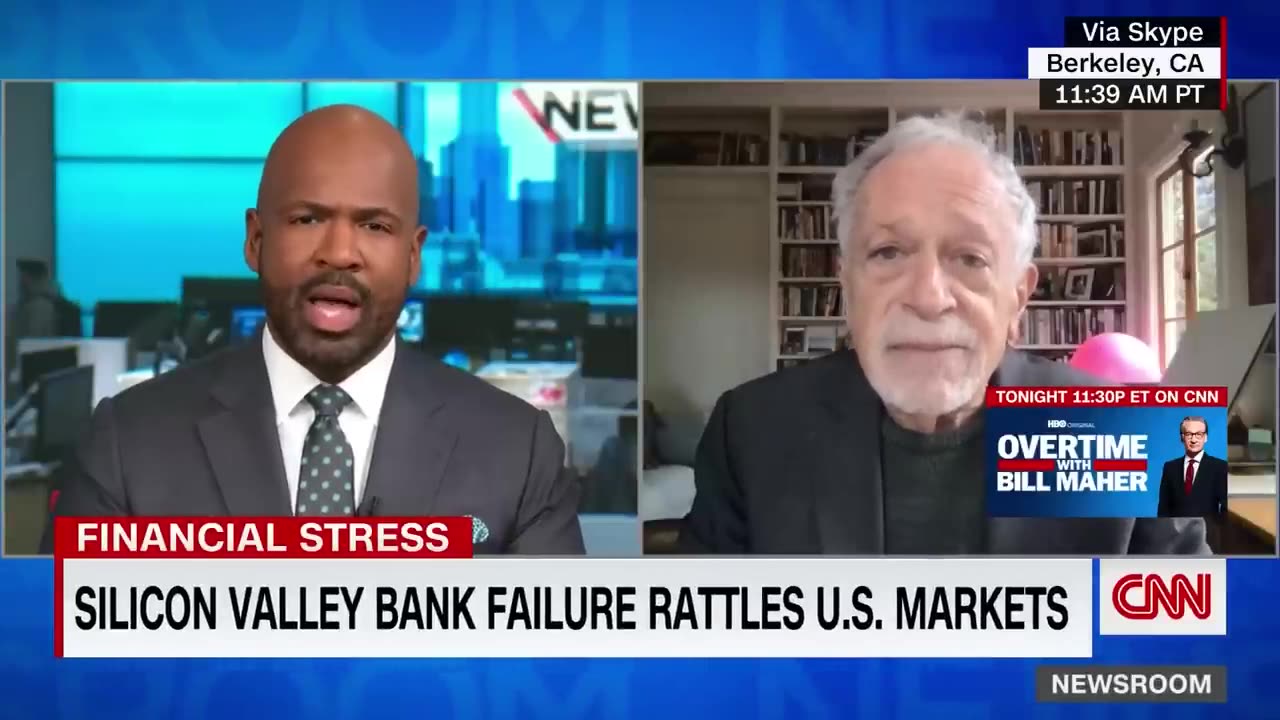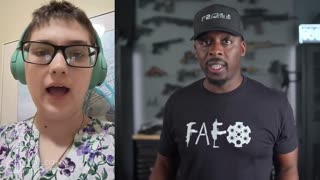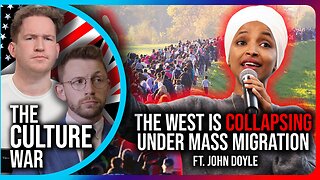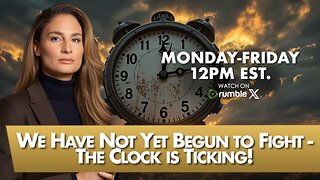Premium Only Content

SVB collapse is second-largest bank failure in US history
Silicon Valley Bank collapsed Friday morning after a stunning 48 hours in which a bank run and a capital crisis led to the second-largest failure of a financial institution in US history.
California regulators closed down the tech lender and put it under the control of the US Federal Deposit Insurance Corporation. The FDIC is acting as a receiver, which typically means it will liquidate the bank’s assets to pay back its customers, including depositors and creditors.
The FDIC, an independent government agency that insures bank deposits and oversees financial institutions, said all insured depositors will have full access to their insured deposits by no later than Monday morning. It said it would pay uninsured depositors an “advance dividend within the next week.” CNN's Matt Egan reports. #CNN #MattEgan #cnnnewsroom
A major development in the banking world. The FDIC just reported the California regulators shut down Silicon Valley Bank, a big lender out in California, after reporting a loss of over $1 billion. There were fears of a run on this bank. People wondering if there should have PTSD to 2008. What's going on here? Yeah, this really is an earthquake, especially for the tech community.
00:21
Silicon Valley Bank dropped by 60% yesterday alone. We just learned today that California regulators have shut this lender down. This is the biggest failure since 2008. It's actually the second biggest failure ever since Washington Mutual in September. Of 2008. This is a major lender tech startups. The FDIC says that insured depositors they will have full access to insured deposits by Monday morning insured deposits that means up to $250,000.
00:54
Of course we know that some small businesses, some startups, some individuals they have more than that $250,000. It's not clear if they're going to get all of their money back. This, of course, is not sitting well in the marketplace. We see the Dow is down by more than 250 points. Banks are leading the way lower.
01:13
The good news here is that experts that I'm talking to, they are hopeful that this is an isolated incident, that this is not part of a broader systemic issue. Mark Zandi, he told me he's the chief economist over at Moody's Analytics. He just told me that he doesn't think that this failure is symptomatic of a broader problem in the banking industry.
01:32
Let's hope not, because that's the last thing we need right now. You know, the major banks are saying that they are well-capitalized. Matt Egan, thank you. Robert Reich, former U.S. labor secretary under President Clinton, is with us now, also the author of The System Who Rigged It and How We Fix It. Secretary Rice, always good to have you.
01:51
Let's start where Matt ended with this. Silicon Valley Bank, the FDIC now in control. We saw that there was some stumbles from Wells Fargo, JPMorgan Chase, Bank of America. Other banks trading their halted yesterday. What does this mean for people outside of the Silicon Valley bank universe? What does it mean for the average borrower, if anything? So far, it doesn't mean anything.
02:18
But the big question is one of contagion. That is what we saw in 2008 was when one big bank and a couple of others started to fail. Or could not pay their depositors, could not actually pay up what they owed. They were closed and regulators had to move in very, very quickly. But we ended up with a financial crisis because, you know, one big banking card easily starts tipping over other cards.
02:48
It's a house of cards. Now, we don't know yet about contagion. What we do know is that this bank was obviously overextended and this is related to the Fed because as interest rates went up and as and this bank was lending to a lot of startups, this bank simply could not handle it. I think that this is the biggest economic news today.
03:10
It is not. This jobs report report was good. And it's kind of signals to me a soft landing. But I think that in terms of what the Fed is going to do and this bank implosion was potential contagion, may reverse. Jerome Powell has a direction it may lead to instead of a half a point increase at the March meeting.
03:35
It may lead to no increase. In fact, it's even conceivable that interest rates start dropping out, but fear that we're going to be in deep trouble. You have advocated for the Fed to stop increasing the interest rate. Why before this issue with Silicon Valley Bank now? Simply because I don't see any wage price inflation, wages, according to Jerome Powell, are pushing up prices.
04:02
Well, that's simply not the case. Look at today's report, for example, we we are seeing the smallest wage increase in over a year. Prices continue to rise. That is absolutely true. But wages are not pushing them up. It's not that workers are doing so wonderfully well. And what's pushing up many prices domestically in big companies that want to increase their profit margins.
04:24
And so they have monopolies or near monopolies, oligopolies. They are using the opportunity, using inflation as an excuse to put up their prices. So this is at its at its bottom here. It really is an anti-trust monopolization issue. It is not a Fed interest rate problem. So you suggest that the Fed should stop increasing the interest rate, but if that is the only tool they have.
04:49
I imagine you're going to correct that assumption. But if that is the only tool they have to try to bring it back down, to the 2% rate, that goal, then what else can they do to to to try to tame inflation, if not increase the interest rate? Well, first of all, let me just say, it's not clear that they have to do anything else.
05:11
Inflation is starting to come down. Now, we'll find out more Tuesday when the inflation report the consumer price in Greece, increased report, inflation report will be coming out. But as of what we know now, inflation is slowing slightly. As the key here is the direction. You know, if inflation were increasing, that would be one thing but if inflation is starting to slow down, if we're seeing it going in the right direction, then it's not clear that the Fed has got to keep raising interest rates and risking a recession
05:45
that is going to hurt everybody.
-
 LIVE
LIVE
Side Scrollers Podcast
2 hours agoTwitch CONTROVERSY Hit New Low + Reddit Mods QUIT + FireMAN is Now Sexist + More | Side Scrollers
2,610 watching -
 10:18
10:18
Colion Noir
1 hour agoViral TikTok Proves Gun Owners Wrong?
5 -
 5:31
5:31
John Rich Official
12 days agoThe Righteous Hunter by John Rich
3.09K3 -
 LIVE
LIVE
Rebel News
44 minutes agoEby threatens to block pipeline, Guilbeault out of cabinet, Land disputes continue | Rebel Roundup
303 watching -

Robert Gouveia
2 hours agoAmerican Soldier DEAD! Trump Furious! Afghan 'Vetted by CIA'! Third World FREEZE!
24.4K18 -
 48:48
48:48
The Culture War with Tim Pool
2 hours agoThe West Is COLLAPSING Under Mass Migration | The Culture War's Across The Pond
9.8K37 -
 LIVE
LIVE
The Mel K Show
2 hours agoMORNINGS WITH MEL K - We Have Not Yet Begun to Fight - The Clock is Ticking! 11-28-25
989 watching -
 LIVE
LIVE
Film Threat
14 hours agoHOLLYWOOD FOR SALE! BLACK FRIDAY BLOW OUT! | Film Threat Livecast
124 watching -
 LIVE
LIVE
The Shannon Joy Show
2 hours agoSJ Show Nov 28 - The SJ Friday Matinee Watch Party With Commentary Featuring The Big Short!
32 watching -
 35:39
35:39
Grant Stinchfield
4 hours agoThe Medical Deep State Exposed — And McCullough Has the Receipts!
3.48K